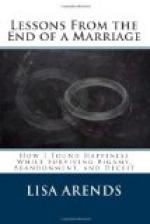THE FAMILY JAR.
“If a man and woman love each other and are every way suited to marry should they yield to the opposition of his grown daughter?” M.A.
This question in varying forms comes to me often. It always stirs within me something I used to call “righteous indignation.” And incidentally it makes me smile. Translate the question into Plain English and anybody can answer it without hesitancy. Put it this way: When two Individuals know what they want and the whole world approves, should they go away back and sit down because a third Individual tries to interfere with their inherent right to the pursuit of happiness?
Of course not. A man or woman old enough to have a grown daughter is old enough to know whether he wants to marry again. Not even the most precocious daughter is a better judge than her father as to what is best for his own happiness.
Ah, there’s the rub! It is not his happiness she is concerned about. It is her own. A new marriage would interfere with the daughter’s plans. She would have to give the chief place to the new wife. She would have to give up a share of the prospective inheritance she has more or less consciously been counting upon. So she opposes her father’s re-marrying.
But apparently not on these grounds—dear, no! Her father is “too old,” or “too weakly,” or the intended wife is “not nice.” The daughter conjures up a dozen excuses, but never the real one; of which she is not fully conscious herself,—and doesn’t want to be.
The parent’s “duty” to children is great; far greater than the child’s duty to parent; but parental self-sacrifice should certainly not be continued for life. A grown daughter is an Individual, who should stand on her own feet and make her own happiness without curtailing the happiness of parents.
Let her leave her father to a renewal of youth and happiness; or let her gracefully and kindly accept her rightful second place and use her loving energies in helping to make bright the home.
A sensible, well trained, loving daughter will do one of these two things.
A sensible, well trained, loving parent will consider his daughter’s feelings and will do all he can to gain her willingness before he marries; but he will not make a lasting sacrifice of his own and the other woman’s happiness simply to please a selfish girl.
If daughter and parent are not sensible, well trained and loving, it will be a case of frying pan or fire either way.
The recognition of individual rights to the pursuit of happiness according to individual desire, is the only basis of happiness in family relations.
The daughter who helps her father do as he desires will find him ready to help her do as she desires. And vice versa.
The daughter who “opposes” her father’s marriage is quite apt to be the daughter who has been opposed by her father; he reaps as he has sown. Or else she is the daughter who has been brought up with the idea that parents are a mere convenience for her use.




